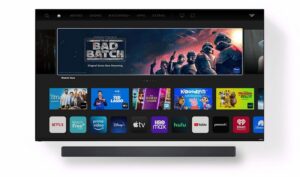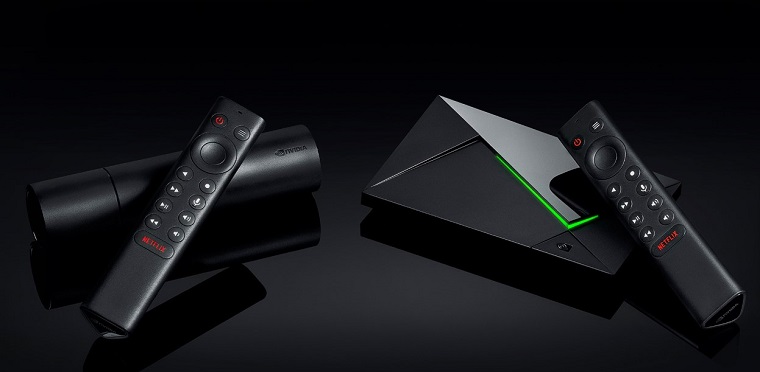[POLL] Should Samsung & other smart TV makers disable system ads?
— PiunikaWeb (@PiunikaWeb) November 14, 2021
Vote below & read our opinion here: https://t.co/pPqYFB42UB
New updates are being added to the bottom of the story…
Original story (from Nov 14) follows:
As an 80s kid, I had a chance to actually use a dumb TV. And that too for quite some time. But with smart TVs just about everywhere and that too at affordable prices, I mean, why not have one?
When I interact with my current Samsung smart TV, though, there are a bunch of things I feel technology has essentially robbed me off.
The overall TV experience today is significantly different compared to a few decades ago. Gone are the days when you could actually power on a TV and dictate what you wanted to see.

I could easily pick up a remote, hit the power button and scroll through available channels without any intrusive commercials. In recent times, however, companies have been doing their best to change this experience.
Make no mistake, I still wouldn’t trade my current 49-inch UHD TV for the thick 21-inch Samsung dumb TV my old man had back in the day. But with the continued persistence from smart TV makers to include system ads that cannot be disabled, I may have something to think about going into Christmas holidays.
Today, Big Tech companies like Apple, Alphabet (Google), and Samsung have more than perfected their crafts when it comes to hardware and software development after years in the business.
The latest iPhone is built to last over 5 years with good usage and care. For a stationery smart TV, it can be significantly more. This prolonged use means companies are becoming less reliant on hardware sales.
With long-term hardware sales nosediving, Big Tech companies are actively looking for other means to keep generating more revenue, and software is proving to be a good bet.
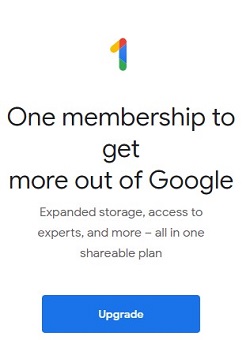
In today’s digital era, more and more companies prefer leasing or renting products to users at a small weekly, monthly or annual charge rather than let you fully own it.
Some carriers prefer selling phones at monthly instalments. This way, they get to keep you locked to their network for 2 years, at a point which they’ll offer you a similar deal on the newest and shiniest phone available.
Samsung removed the microSD card and no longer churns out 1TB storage models so that you can subscribe to its cloud storage service. Google killed unlimited Photos storage so that you pay for extra GBs from their cloud storage to keep your photos safe.
Apple is no angel either, and they’d rather dissolve the entire company than stick a microSD card into an iPhone because this would rob them off billions generated from iCloud storage.
And as things stand, it seems this model of doing business is the way to go for most big companies with established and trusted software-based platforms. But as you’d expect, some are now beginning to cross the line.
Take a recent case involving Samsung, for instance, where an irate smart TV owner stormed Twitter after they couldn’t figure out how to disable an ad that was taking up nearly half of the program guide screen.
What started as a simple inquiry ended up revealing a lot about the seemingly shady practices that Samsung and other smart TV makers have resorted to as long as revenues keep flowing.
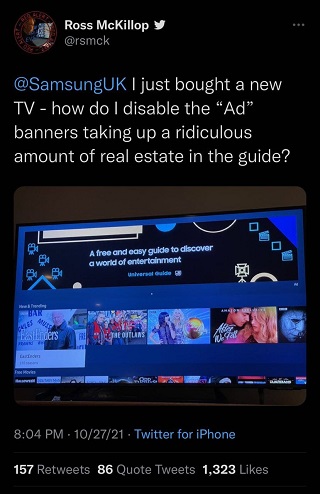
Hear me out. I have no problem with ads showing up on my home screen or program guide if some sort of coupon was included when buying the smart TV.
However, if I’m paying the full price for a $2,500 smart TV as valued by the manufacturer or seller for that matter, as the owner, I should dictate what I see on my expensive piece of gadget.
In response to the query above, Samsung UK implies that even after paying a small fortune, you still are not allowed to decide what to see on the TV. Instead, Samsung calls the shots.
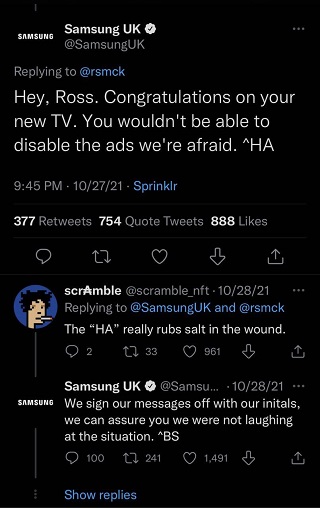
This puts into question whether you really own the $1,000, $2,000 or $3,000 TV mounted on your wall or if Samsung still owns it despite having banked your money.
When I go out to buy a smart TV, I essentially pay for both hardware and software so I should be able to own them, but this hasn’t been the case for the latter with not only Samsung but also other smart TV brands looking to make more money from the vast amounts of user data they’ve collected over the years.
While Samsung claims some smart TV customers find these ads useful, it’s hard to believe when several others can confirm that they only get ads to buy yet another Samsung product.
Buy £3k Samsung TV, get an ad on it to buy £1k Samsung phone. Think you mistyped “board members” as “customers” in your reply ^FU
Source
Ironically perhaps the TV is currently trying to get me to buy one of the phones … this is also misleading marketing as the product photography shows this UI but with no adverts…
Source
According to recent stats, just about every smart TV maker serves ads in a way or the other, with only select HiSense, Sony and TCL models allowing users to opt out of ads.
Locking the option to opt out of ads means more money for TV makers through ad revenue. Smart TV maker Vizio, for instance, recently revealed that ads, subscriptions, and data rake in double the profits it makes from selling TVs.
With this trend, more brands will definitely be looking to slice a piece of this huge cake. But perhaps there’s an easy way to stop them. Don’t buy a smart TV, instead, get a dumb TV.
And by dumb TV I don’t mean anything near my father’s 21-inch unit from the 90s, but one that can fit into your setup as a dumb monitor. A TV with an HDMI port to house a Chromecast or any other dongle and give you access to ad-free shows on Netflix, Disney+ and other streaming platforms.
After all, if Samsung did acknowledge and accept to remove ads from stock apps on Galaxy devices, they can definitely do the same with respect to their pricier smart TVs. And other smaller vendors will likely follow.
As you join the conversation in the comments section, be sure to check out this guide on how to disable ads on Samsung and other smart TVs powered by Android TV.
You may also take part in our Twitter poll below, which ends in a week’s time.
Update 1 (Nov 21)
Of the people who voted, majority are of the opinion that Samsung & other smart TV makers should indeed disable system ads. What’s your thought? Let us know in the comments section below.
PiunikaWeb started as purely an investigative tech journalism website with main focus on ‘breaking’ or ‘exclusive’ news. In no time, our stories got picked up by the likes of Forbes, Foxnews, Gizmodo, TechCrunch, Engadget, The Verge, Macrumors, and many others. Want to know more about us? Head here.

![[Poll results live] Why you should reconsider buying a smart TV [Poll results live] Why you should reconsider buying a smart TV](https://piunikaweb.com/wp-content/uploads/2020/12/SmartView_Main_1.jpg)
